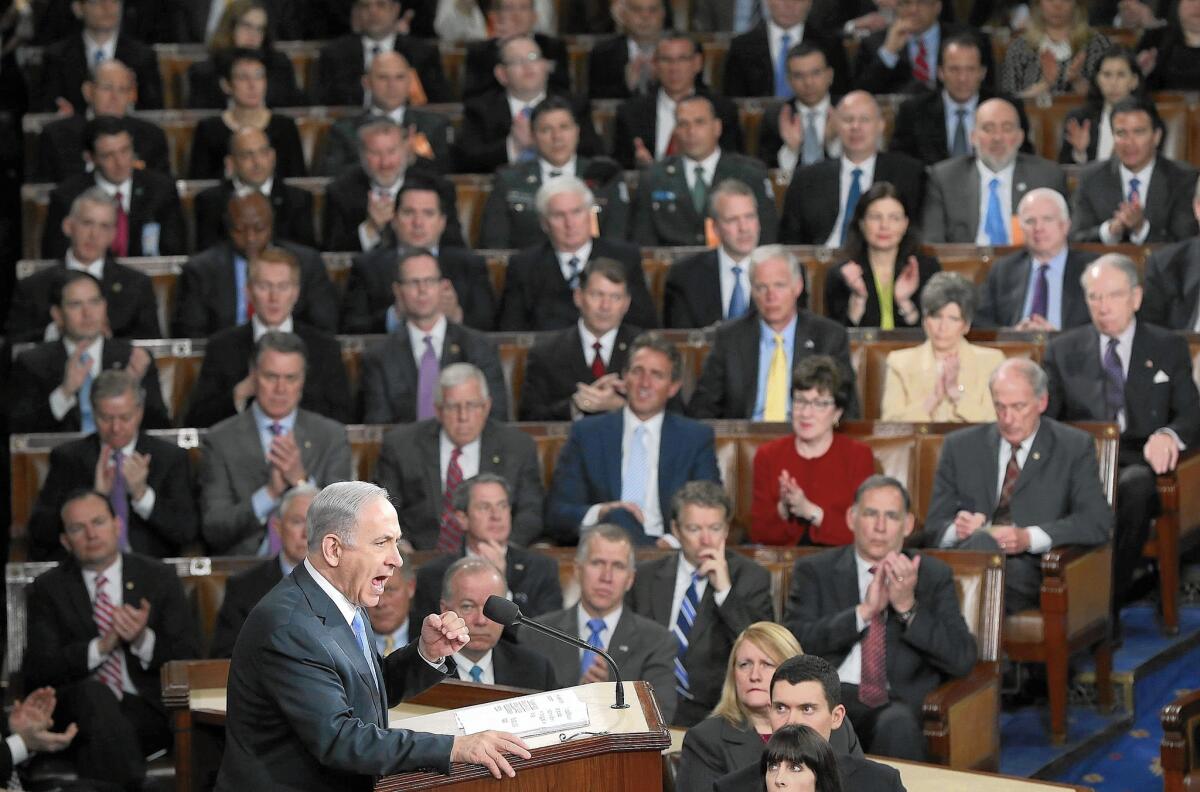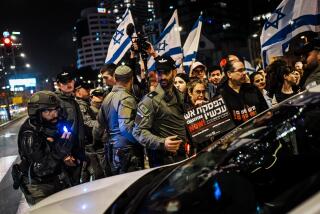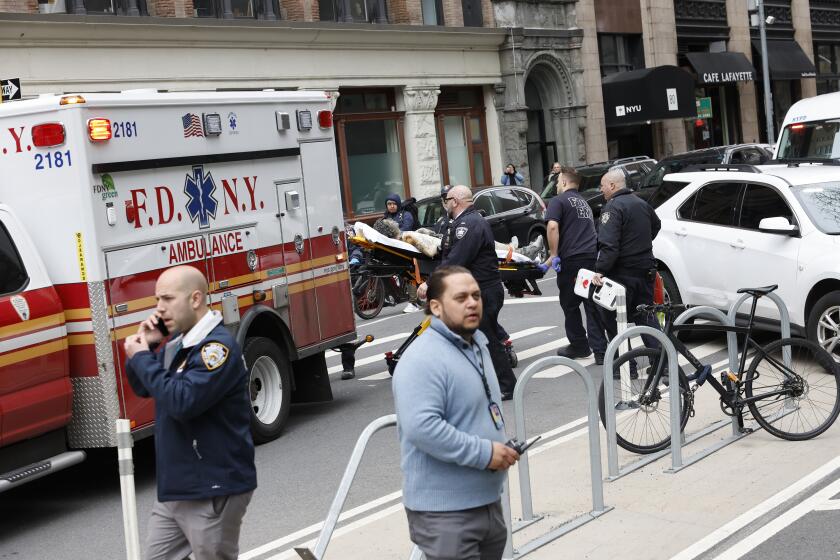In the end, Israelis tend to vote for security over all else

In the final full week of a tightly contested election campaign, a peculiarly Israeli paradox is on clear display.
Polls show that a majority of voters are most passionate about socioeconomic conditions that color their daily lives — issues such as being middle-class yet living with overdrawn bank accounts, or being 40 years old and unable to afford an apartment without a parent’s help.
But historical balloting patterns suggest that when Israelis are alone in the voting booth, security concerns come to the fore.
Benjamin Netanyahu, facing a tough challenge as he seeks to become the country’s longest-serving prime minister since founding father David Ben-Gurion, played masterfully last week to those security worries in a State of the Union-style address in the U.S. Capitol, engineered by congressional Republicans. In it, he likened the Iranian nuclear threat to the dark days leading up to the Holocaust and referred repeatedly to an array of threats to Israel’s existence.
It has been a message central to Netanyahu’s campaign that will culminate in a March 17 vote. In an early, telling political ad, the Israeli leader’s strategists portrayed his two main opponents, former Foreign Minister Tzipi Livni and Labor Party chief Isaac Herzog, as cartoon figures who dither, bicker and panic as a red phone — code for a military or other emergency — rings on unanswered. “At the moment of truth: Netanyahu,” the final caption reads.
It’s not the stuff of subtlety, but it speaks to a primal political reality in Israel, where existential fears are integral to the national psyche. The prime minister, a former elite commando, consistently portrays himself as a seasoned guardian of Israel’s safety — a tactic that his camp hopes will provide a crucial last-minute edge in a contest now seen as a dead heat, with one-fifth of the electorate still undecided.
“It suits Netanyahu to generate spin or actual events that keep attention focused on his agenda of external issues — Iran, terror, security. This is the court he’s always played on,” said Gabriel Weimann, a professor of communications at the University of Haifa.
And in Israeli politics, that has traditionally been a winning formula. “At the end of the day, when they go to vote,” Weimann said, “it’s primarily about the one they want answering the red phone.”
This time around, though, economic discontent is running particularly high. More than two-thirds of Israelis borrowed money in the last year, according to the latest statistics, and more than 40% are overdrawn on their checking accounts. Nearly a fifth of Israelis live below the poverty line, including 1 out of every 3 children.
Netanyahu’s opponents have pushed the message that a weakening social fabric poses as great a threat to national steadfastness and unity as any external menace.
“We deserve to wake up in the morning and smile, not to see poverty, sadness and anger,” opposition candidate Livni said in a new video clip posted on her Facebook page. “This is our home — this is Israel.”
A new poll suggests that lower-income voters are more likely to support Netanyahu’s main opponent, the Zionist Union, awarding it 26 parliamentary seats to 21 for the prime minister’s Likud Party.
But people are torn: The survey, conducted by the TRI polling institute, also asked poorer voters who would best look out for them. The top scorer: Netanyahu.
As elsewhere, image matters in Israeli politics, and even detractors acknowledge that Netanyahu is a commanding and charismatic presence. His main opponent, Herzog, presents a sharp contrast: He has an unprepossessing physique and a reedy voice that he has made light of with an ad that featured his words dubbed by an actor with an imposing baritone.
With Israel’s near-universal compulsory military service, an army background is almost a given for men in Israeli public life, especially those of Netanyahu’s generation. Where the prime minister’s military service was classically macho — a stint in the storied Sayeret Matkal special forces, along with a brother who was mourned as a national hero when he was killed in the course of the Entebbe hostage rescue — Herzog’s was more cerebral, in the prestigious 8200 intelligence unit.
But even if security is considered paramount by nearly all, Israelis do differ on how best to achieve it. For some, the failure to engage the Palestinians in peace negotiations, coupled with the eruption of conflicts every few years in the Gaza Strip, is the more dangerous course.
“I lost the love of my life this summer,” said Michal Kesten-Keidar, whose husband, Lt. Col. Dolev Keidar, was killed in the seven-week war that Israel and Hamas fought in Gaza in July and August. “And I would ask voters to vote for the one who will try to prevent the next war, and not only because of promises to lower the price of cottage cheese.”
Herzog said that if he becomes prime minister — a post he says he would share with Livni if their Zionist Union wins — a top priority would be trying to “reignite” a peace process with the Palestinians, something Netanyahu is considered unlikely to do.
Herzog has pledged that if he became prime minister, he would meet with Palestinian Authority President Mahmoud Abbas and freeze settlement construction outside major blocks. Livni, for her part, served as a negotiator in peace talks that collapsed last year.
Palestinians generally believe any peace efforts will remain moribund if Netanyahu triumphs. “As long as the right wing controls the government we can expect that extremist policies such as settlements and making life difficult for Palestinians are going to continue,” said analyst Jihad Harb, who is based in Ramallah, in the West Bank.
Some in Israel have already voiced unease that after Netanyahu’s open confrontation with President Obama over his speech to Congress, electoral victory for him could leave Israel isolated and vulnerable in the international arena.
The Palestinians, who moved last year to join the International Criminal Court, plan to push ahead next month with a bid to bring war-crimes charges against Israel in connection with the latest conflict in Gaza, among other things. The all-but-automatic U.S. veto of Security Council resolutions targeting Israel — including one last year that would have set a timetable for Palestinian statehood — could even be in jeopardy if the rift with the American administration deepens, some commentators assert.
Still, nearly half of Israeli voters said they believed Netanyahu’s Washington appearance bolstered his standing — though in the days that followed, polls showed no noticeable “bounce” for him.
Netanyahu’s stagecraft got a high-visibility nod on the night of the speech, which was broadcast in Israel with a five-minute delay so authorities could excise any part of the address — or his chief opponent’s rebuttal — that was deemed to be overt electioneering.
Herzog, campaigning at the time in Israeli hamlets near the Gaza boundary — spoke only briefly before he was cut off mid-sentence. But not a word of Netanyahu’s speech was lost.
Despite the prime minister’s perceived expertise in security issues, he has some powerful detractors, one of whom made a riveting appearance at a rally Saturday night in Tel Aviv. Speaking before a crowd of tens of thousands gathered in Rabin Square, Meir Dagan, the former head of the Mossad spy agency and a decorated veteran of Israel’s wars, said he was frightened by what he called the country’s crisis of leadership.
“We have a leader who is fighting only one battle,” he said. “The battle for his own political survival.”
Times staff writer King reported from Tel Aviv and special correspondent Sobelman from Jerusalem. Special correspondent Maher Abukhater in Ramallah contributed to this report.
@laurakingLAT
More to Read
Start your day right
Sign up for Essential California for news, features and recommendations from the L.A. Times and beyond in your inbox six days a week.
You may occasionally receive promotional content from the Los Angeles Times.






